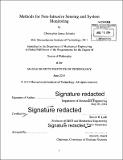Methods for non-intrusive sensing and system monitoring
Author(s)
Schantz, Christopher James
DownloadFull printable version (35.40Mb)
Other Contributors
Massachusetts Institute of Technology. Department of Mechanical Engineering.
Advisor
Steven B. Leeb.
Terms of use
Metadata
Show full item recordAbstract
Improving the efficiency of collection, transmission, and consumption of resources is the focus of a wide swath of engineering research. Current technological solutions for capturing or mitigating energy and resource waste are asymmetrical. A dilemma is becoming increasingly apparent in monitoring and control systems. Networking tools provide potentially inexpensive remote access to information, but gathering useful information, however, may require the installation of an array of costly and intrusive sensors. The promise of highly effective and useful networked solutions is hemmed in by a sensing frontier consisting of significant challenges. At any time in the service life of a machine or system it may perform below its design efficiency. Valves may leak, belts might slip, and equipment may be left on when not needed. Systems under feedback control like HVAC plants will mask the effect of incipient faults from the user by increasing their duty cycle and wasting energy. Water distribution networks will supply healthy and leaky loads alike without obvious change save in perhaps a monthly bill delivered in the mail. To meet these challenges, this thesis uses easily installed non-intrusive sensors coupled with advanced signal processing algorithms to provide a collated corrected picture of consumption and to provide opportunities for fault detection. Specific contributions are made in three areas: Electric motor driven machine fault detection; a motor like an induction machine can serve as its own fine resolution speed and torque sensor with performance to rival optical shaft encoders and exceeding most torque sensors, all from simple voltage and current signals. Full time fluid flow and hydraulic load tracking from clamp on vibration and magnetic field sensing. Non intrusive techniques for capturing vibration data for rotating machine fault detection, and methods to combine electrical and vibration information to create virtual inputs for performing output only or single sensor system identification.
Description
Thesis: Ph. D., Massachusetts Institute of Technology, Department of Mechanical Engineering, 2014. Cataloged from PDF version of thesis. Includes bibliographical references.
Date issued
2014Department
Massachusetts Institute of Technology. Department of Mechanical EngineeringPublisher
Massachusetts Institute of Technology
Keywords
Mechanical Engineering.